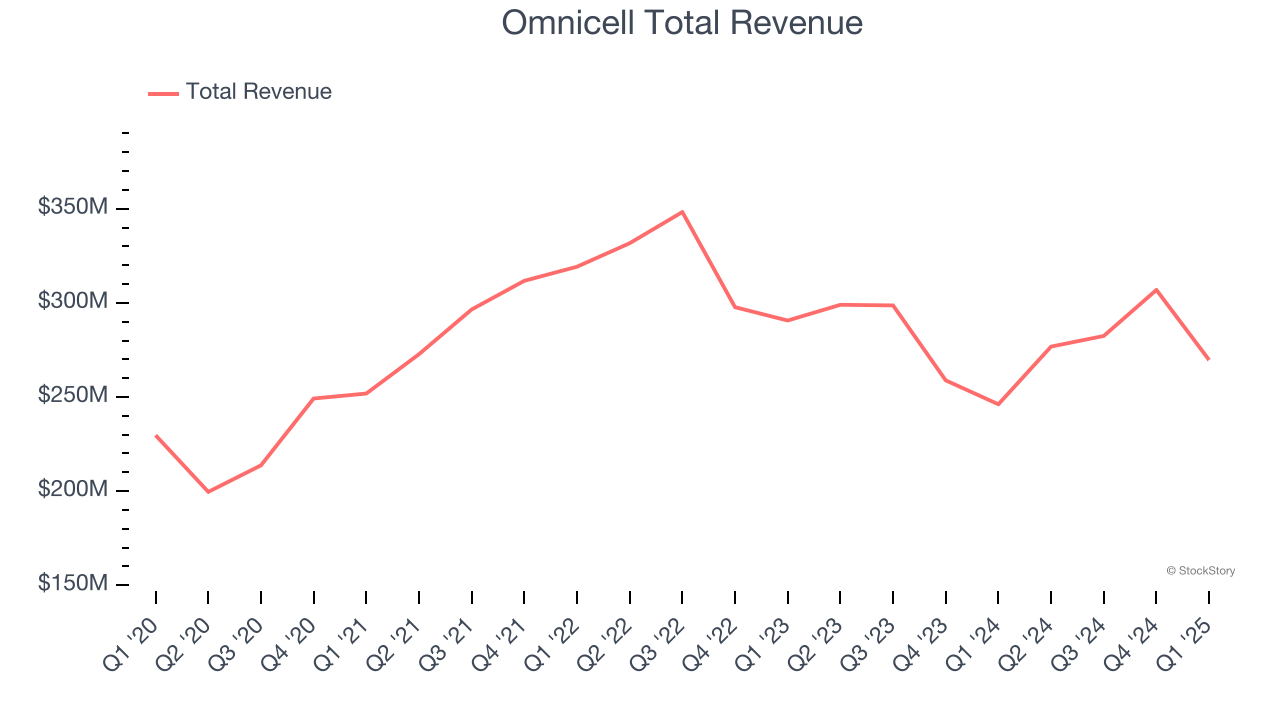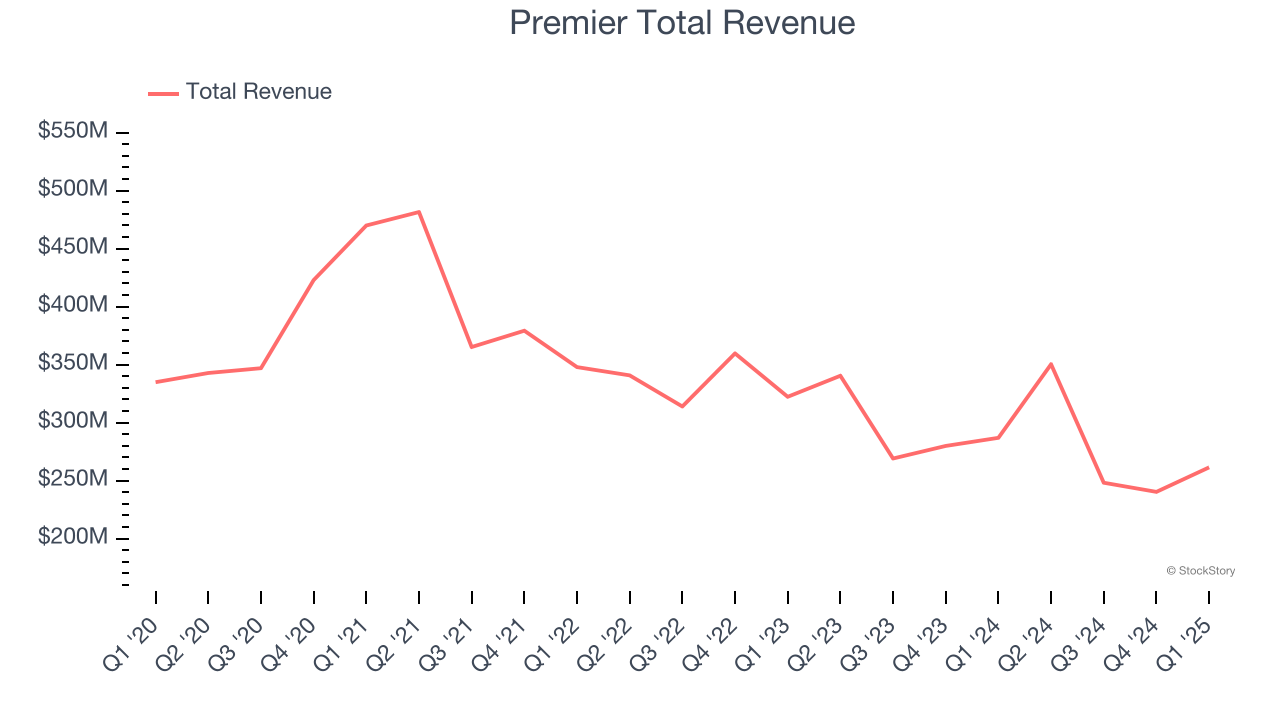
The end of an earnings season can be a great time to discover new stocks and assess how companies are handling the current business environment. Let’s take a look at how Omnicell (NASDAQ: OMCL) and the rest of the healthcare technology for providers stocks fared in Q1.
The healthcare technology sector provides software and data analytics to help hospitals and clinics streamline operations and improve patient outcomes, often through value-based care models. Future growth is expected as providers prioritize digital transformation to manage rising costs and patient demands. Tailwinds include the adoption of AI-driven tools and government incentives for digitization. There challenges as well, including long sales cycles and slow adoption by providers, who may be resistance to change. Tightening hospital budgets and cybersecurity threats are additional risks that could slow adoption.
The 5 healthcare technology for providers stocks we track reported a mixed Q1. As a group, revenues beat analysts’ consensus estimates by 4% while next quarter’s revenue guidance was 0.7% below.
Amidst this news, share prices of the companies have had a rough stretch. On average, they are down 8.4% since the latest earnings results.
Omnicell (NASDAQ: OMCL)
Driven by the vision of an "Autonomous Pharmacy" with zero medication errors, Omnicell (NASDAQ: OMCL) provides medication management automation and adherence tools that help healthcare systems and pharmacies reduce errors and improve efficiency.
Omnicell reported revenues of $269.7 million, up 9.6% year on year. This print exceeded analysts’ expectations by 3.7%. Despite the top-line beat, it was still a slower quarter for the company with full-year EBITDA guidance missing analysts’ expectations.

The stock is down 4.2% since reporting and currently trades at $29.22.
Read our full report on Omnicell here, it’s free.
Best Q1: Premier (NASDAQ: PINC)
Operating one of the largest healthcare group purchasing organizations in the United States with over 4,350 hospital members, Premier (NASDAQ: PINC) is a technology-driven healthcare improvement company that helps hospitals, health systems, and other providers reduce costs and improve clinical outcomes.
Premier reported revenues of $261.4 million, down 8.9% year on year, outperforming analysts’ expectations by 7.4%. The business had a very strong quarter with an impressive beat of analysts’ EPS estimates and a solid beat of analysts’ full-year EPS guidance estimates.

Premier achieved the biggest analyst estimates beat among its peers. The market seems happy with the results as the stock is up 8.6% since reporting. It currently trades at $22.30.
Is now the time to buy Premier? Access our full analysis of the earnings results here, it’s free.
Weakest Q1: Astrana Health (NASDAQ: ASTH)
Formerly known as Apollo Medical Holdings until early 2024, Astrana Health (NASDAQ: ASTH) operates a technology-powered healthcare platform that enables physicians to deliver coordinated care while successfully participating in value-based payment models.
Astrana Health reported revenues of $620.4 million, up 53.4% year on year, falling short of analysts’ expectations by 2.5%. It was a slower quarter as it posted revenue guidance for next quarter meeting analysts’ expectations and full-year EBITDA guidance slightly missing analysts’ expectations.
Astrana Health delivered the fastest revenue growth but had the weakest performance against analyst estimates and weakest full-year guidance update in the group. As expected, the stock is down 21.8% since the results and currently trades at $26.11.
Read our full analysis of Astrana Health’s results here.
Evolent Health (NYSE: EVH)
Founded in 2011 to transform how healthcare is delivered to patients with complex needs, Evolent Health (NYSE: EVH) provides specialty care management services and technology solutions that help health plans and providers deliver better care for patients with complex conditions.
Evolent Health reported revenues of $483.6 million, down 24.4% year on year. This number topped analysts’ expectations by 4.9%. Taking a step back, it was a mixed quarter as it also recorded full-year revenue guidance slightly topping analysts’ expectations but a significant miss of analysts’ EPS estimates.
Evolent Health delivered the highest full-year guidance raise but had the slowest revenue growth among its peers. The stock is down 22.9% since reporting and currently trades at $8.30.
Read our full, actionable report on Evolent Health here, it’s free.
Privia Health (NASDAQ: PRVA)
Operating in 13 states and the District of Columbia with over 4,300 providers serving more than 4.8 million patients, Privia Health (NASDAQ: PRVA) is a technology-driven company that helps physicians optimize their practices, improve patient experiences, and transition to value-based care models.
Privia Health reported revenues of $480.1 million, up 15.6% year on year. This print surpassed analysts’ expectations by 6.5%. It was a strong quarter as it also put up a solid beat of analysts’ EPS estimates and sales volume in line with analysts’ estimates.
The stock is down 1.8% since reporting and currently trades at $22.89.
Read our full, actionable report on Privia Health here, it’s free.
Market Update
Thanks to the Fed’s series of rate hikes in 2022 and 2023, inflation has cooled significantly from its post-pandemic highs, drawing closer to the 2% goal. This disinflation has occurred without severely impacting economic growth, suggesting the success of a soft landing. The stock market thrived in 2024, spurred by recent rate cuts (0.5% in September and 0.25% in November), and a notable surge followed Donald Trump’s presidential election win in November, propelling indices to historic highs. Nonetheless, the outlook for 2025 remains clouded by potential trade policy changes and corporate tax discussions, which could impact business confidence and growth. The path forward holds both optimism and caution as new policies take shape.
Want to invest in winners with rock-solid fundamentals? Check out our Top 5 Growth Stocks and add them to your watchlist. These companies are poised for growth regardless of the political or macroeconomic climate.





